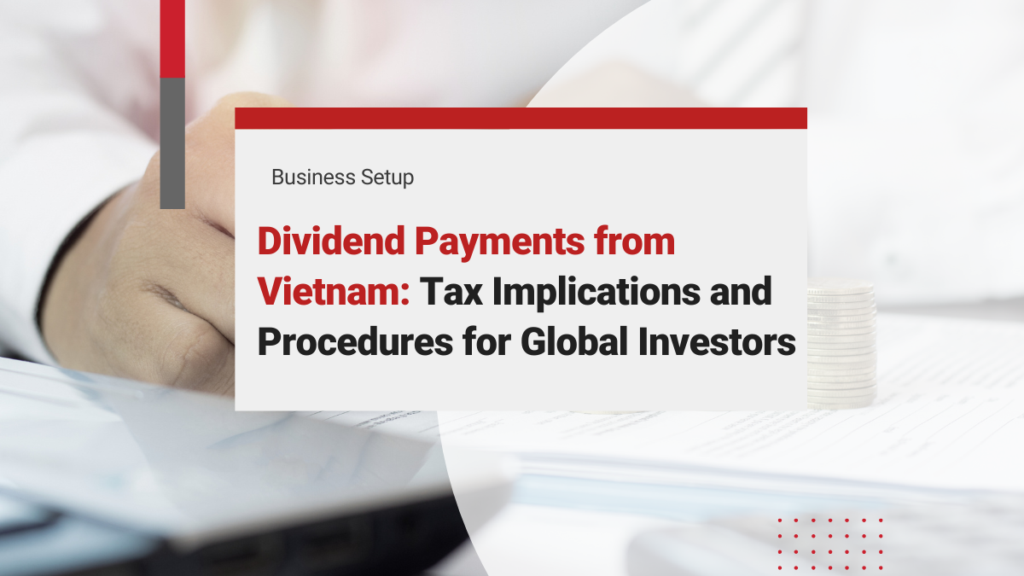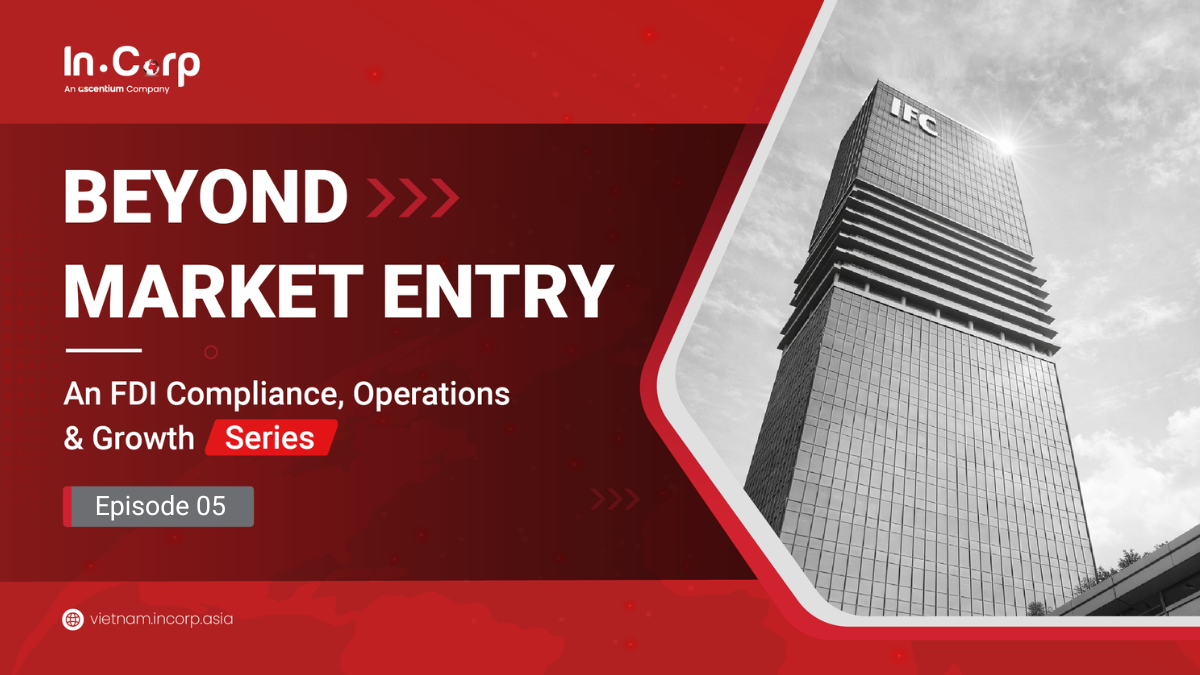Investors looking into dividend payments from Vietnam must grasp the declaration process, tax rules, and repatriation steps. This article breaks down these essential elements, helping you efficiently manage your investments in Vietnam.
Looking to get advice to remain compliant with tax obligations? Get tax and legal advisory services from us!
Key Requirements for Declaring Dividends in Vietnam
Understanding the key requirements for declaring dividend payments from Vietnam ensures compliance and smooth financial operations. A Vietnamese company must have positive retained earnings and not be in a loss position for that year to declare a dividend.
Profits after tax and the absence of accumulated losses must be confirmed before declaring any dividend payments from Vietnam. Additionally, dividends can only be disbursed after the company has settled its corporate income tax obligations.
Companies in Vietnam must fulfill all tax and financial obligations to repatriate dividend payments from Vietnam. Strategic planning of dividend declarations prevents delays and complications by aligning them with periods when financial requirements are met. A formal dividend policy clarifies payment procedures and timelines, keeping all stakeholders informed and aligned.
Lack of retained profits or current-year losses can prevent dividend declarations, creating time constraints for foreign investors. Therefore, companies should proactively maintain positive financial health and plan their dividend declarations accordingly.
Read More: An Essential Guide to Taxation & Compliance Deadlines in Vietnam
Taxation on Dividend Payments
Taxation on dividend payments from Vietnam is a key consideration for global investors. The Vietnamese tax system imposes different obligations depending on the shareholder type.
Corporate shareholders benefit from the absence of withholding taxes on dividend payments from Vietnam, while individual shareholders face specific tax rates. Knowing these tax obligations is crucial for effective financial planning and maximizing investment returns.
Foreign investors must be well-informed about applicable tax rates and compliance requirements in Vietnam. This knowledge helps navigate the complexities of dividend payments from Vietnam and ensures all necessary tax obligations related to foreign investment are met.
Corporate Shareholders
For corporate shareholders, Vietnam offers a favorable tax environment. There is no withholding tax for corporate shareholders when receiving dividends from Vietnamese companies. Moreover, dividends received from these companies are not subject to Corporate Income Tax (CIT). This exemption allows foreign corporate shareholders to maximize their net profit from investments.
The absence of withholding tax on dividend payments from Vietnam ensures shareholders’ overall income remains unaffected by additional tax burdens. This favorable tax treatment makes investing in Vietnamese companies particularly attractive for foreign parent companies and joint stock companies.
Individual Shareholders
Individual shareholders are subjected to a 5% withholding tax on dividends as Personal Income Tax. This flat tax rate applies to dividends paid to both resident and non-resident individuals. The 5% withholding tax significantly impacts the net income individual shareholders receive from their investments.
This 5% tax rate applies uniformly regardless of residency status, ensuring straightforward tax obligations for individual shareholders in Vietnam. Understanding this tax implication, including preferential tax rates, is crucial for individual investors to plan their financial returns and manage tax responsibilities effectively.
Financial Documentation for Repatriating Dividends
Vietnamese companies must adhere to stringent financial documentation requirements to repatriate dividends to foreign investors. Audited financial statements must be submitted to the authorities for the year in which dividends are declared. This documentation ensures transparency and compliance with local regulations, essential for dividend remittance.
Dividends can only be paid after settling all taxes and government financial obligations, as well as other financial obligations. This includes fulfilling all tax obligations to avoid legal complications or objections from tax authorities. Adhering to local regulations regarding remittance and documentation ensures the smooth repatriation of pay dividends.
Foreign corporate shareholders can repatriate the full dividend amount after meeting local regulations. These requirements ensure all financial obligations are met, making the repatriation process transparent and compliant with Vietnamese laws.
Process of Paying Dividends to Foreign Investors
Paying dividends to foreign investors involves meticulous compliance with Vietnamese regulations. Companies should liaise with their bank to ensure all necessary documents for currency conversion and remittance are in order. Dividend payments should be made through either a Direct Investment Capital Account (DICA) or an Indirect Investment Capital Account (IICA).
Proper commercial and tax planning helps foreign investors achieve their objectives in Vietnam. Banking issues may arise from using incorrect accounts or not obtaining the required documentation for payments. Understanding the process and complying with regulations are essential for successful dividend payments from Vietnam.
Direct Investment Capital Account (DICA)
A Direct Investment Capital Account (DICA) must be established with a commercial bank to facilitate dividend repatriation from foreign investments. This account manages the inflow and outflow of investment capital and ensures compliance with Vietnamese regulations.
Foreign investors can open only one DICA per currency at a licensed bank in Vietnam. This requirement ensures all transactions are monitored and managed efficiently, providing a clear record of investments and repatriations.
Indirect Investment Capital Account (IICA)
The Indirect Investment Capital Account (IICA) facilitates dividend payments for foreign investors in Vietnam. The key difference between IICA and DICA lies in the ownership structure and type of eligible investments for each account.
IICA allows foreign investors to repatriate dividends from their investments in Vietnam while adhering to necessary regulations. This account manages indirect investments and ensures compliance with local laws.
Read More: Benefits of Outsourcing Bookkeeping in Vietnam: Importance, Common Mistakes, and Best Practices
Common Challenges in Dividend Payments from Vietnam
Dividend payments from Vietnam can present several challenges. A company’s ongoing tax compliance status significantly affects the likelihood of tax authorities objecting to dividend payments. Issues like outstanding tax penalties or incomplete documentation may lead tax authorities to withhold objections to dividend payments.
Common problems include tax issues, period issues related to retained profits, and banking constraints. These challenges can complicate dividend payments and require careful planning and compliance to overcome.
Role of Tax Authorities in Dividend Payments
Local tax authorities play a pivotal role in dividend payments. Declared dividends must be notified to the local tax authority, which has seven days to raise objections. This period allows authorities to review the company’s compliance with tax obligations and other financial regulations.
If tax authorities do not object within the 7-day window, the bank will release the dividend payment. Understanding this process is crucial for companies to ensure timely and compliant dividend payments.
Best Practices for Ensuring Smooth Dividend Payments
Smooth dividend payments require investors to thoroughly understand their tax obligations. Regularly reviewing and staying compliant with tax obligations prevents unexpected issues when declaring dividends.
Maintaining accurate and updated financial records supports dividend declarations. Clear communication channels with banks facilitate timely dividend transactions and prevent banking issues.
How InCorp Can Help?
Getting dividend payments from Vietnam smoothly means knowing the rules, having the right paperwork, and understanding the taxes. Incorp Vietnam helps businesses handle all of this. We make sure your company follows local laws and keeps accurate financial records so you can send dividends to foreign investors without problems. We also help investors understand their tax duties and work with banks to avoid common issues.
By working with Incorp Vietnam, you can make sure your dividend payments are handled correctly and efficiently so you get the most out of your investments. Reach out to Incorp Vietnam to learn how we can assist with your dividend payments.

clients worldwide

professional staff

incorporated entities in 10 years

compliance transactions yearly
Learn the Right Setup for Business
Expansion in the Vietnam
Frequently Asked Questions About Dividend Payments
What is a key requirement for a company in Vietnam to declare and pay dividends?
- A key requirement for a company in Vietnam to declare and pay dividends is that it must have positive retained profits and not be in a loss position for that year.
Are there any withholding taxes for corporate shareholders of Vietnamese companies?
- There are no withholding taxes applicable to corporate shareholders of Vietnamese companies. This allows for greater flexibility in managing investments within the country.
What withholding tax applies to individual ownership of a Vietnamese company?
- A 5% withholding tax applies for Personal Income Tax on individual ownership of a Vietnamese company. Therefore, individuals should factor this tax into their financial planning when considering ownership.






